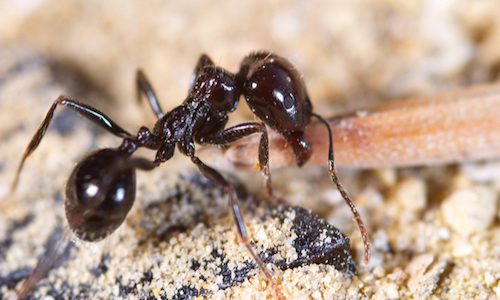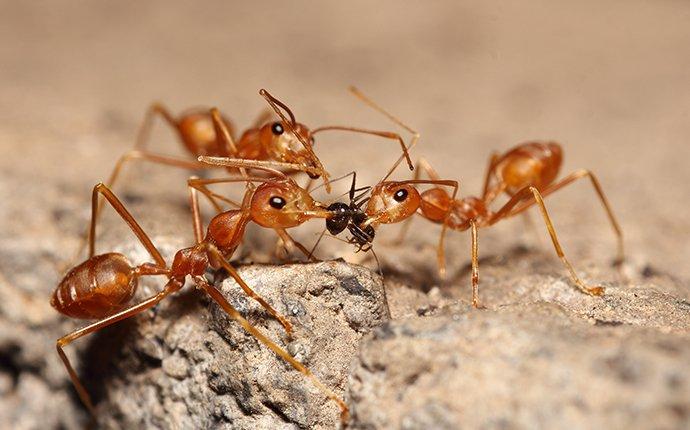Advanced Termite Control: Proven Techniques for Getting Rid Of Termite Infestations
Advanced Termite Control: Proven Techniques for Getting Rid Of Termite Infestations
Blog Article
Ecological Impact of Pest Control: Balancing Performance With Sustainability
The environmental impact of parasite control is an important issue that needs a delicate balance between achieving effectiveness in ensuring and managing parasites sustainability of our ecological communities. From the usage of harmful chemicals that seep into our soil and water to the unintentional effects on non-target types, the effects of conventional pest control techniques are far-reaching.
Damaging Chemicals in Bug Control
The application of dangerous chemicals in insect control presents substantial ecological and wellness threats that warrant mindful consideration and reduction strategies. Pesticides, herbicides, and pesticides are commonly utilized to eliminate parasites, however their widespread application can bring about unexpected consequences. These chemicals can pollute soil, water sources, and the air, impacting not just the targeted pests however additionally helpful insects, wild animals, and humans.

To deal with these threats, integrated insect monitoring (IPM) techniques are being promoted as a much more sustainable option. IPM entails a mix of methods such as biological control, habitat manipulation, and the targeted use pesticides as a last resource (ant control huntersville nc). By embracing an alternative approach to pest control, we can reduce the ecological and health influences connected with unsafe chemicals while successfully managing pest populations
Influence On Non-Target Variety
Thinking about the unexpected effects of pest control methods, the influence on non-target types is an essential facet that needs comprehensive assessment. While bug control procedures intend to target details bugs, other organisms in the community might be accidentally influenced. Non-target types, including valuable pests, birds, animals, and even plants, can endure direct or indirect harm from chemical applications or biological control techniques.
Insecticides created to battle a specific bug parasite might damage pollinators like or all-natural predators such as ladybugs. Biological control representatives, if not species-specific, can pose threats to unplanned targets, interrupting the environmental equilibrium.
To mitigate the influence on non-target species, incorporated insect monitoring (IPM) methods that emphasize an all natural method to pest control are suggested. These techniques focus on using eco-friendly techniques, reducing damage to advantageous microorganisms while successfully taking care of pest populations. Conducting extensive threat assessments and keeping an eye on the outcomes of bug control initiatives are necessary action in securing non-target species and advertising general environment health and wellness.
Soil and Water Contamination
Unplanned environmental repercussions of bug control techniques extend beyond influencing non-target types, with considerable implications for soil and water contamination. Pesticides, herbicides, and chemical fertilizers utilized in bug control can leach right into the dirt and pollute groundwater, presenting a hazard to both aquatic and earthbound ecosystems. Dirt contamination can disrupt the balance of microorganisms necessary for vitamins and mineral cycling and plant growth, causing decreased dirt fertility and performance. These this page chemicals can linger in the atmosphere for prolonged periods, accumulating in the dirt and potentially getting in the food chain.
Water contamination is another vital issue connected with insect control methods. To reduce soil and water contamination from pest control tasks, incorporated insect administration methods that focus on sustainability and lessen chemical inputs are essential.
Air Air Pollution From Pesticide Use
Direct exposure to air-borne pesticides during agricultural applications presents a substantial concern for air contamination control measures. Additionally, chemical drift, where chemicals are carried by the wind to unintended locations, can lead to the contamination of close-by environments and water bodies.

Strategies for Lasting Parasite Control
In the world of agricultural methods, executing sustainable pest control strategies is critical for keeping environmental balance and protecting plant yields. Sustainable bug control highlights the usage of eco-friendly methods to take care of parasite populaces properly while lessening injury to non-target organisms and ecosystems. Integrated Pest Administration (IPM) is a commonly embraced method that combines biological, cultural, physical, and chemical control approaches to accomplish long-term parasite administration options.
One key method in lasting insect control is promoting biodiversity within agroecosystems. By boosting natural adversaries of parasites, such as parasitoids and killers, farmers can decrease the demand for synthetic chemicals. Plant turning and diversity are additionally reliable methods to disrupt pest life process and produce much less positive problems for bugs to thrive. Furthermore, making use of pest-resistant plant selections and utilizing methods like catch cropping can assist minimize parasite pressure without counting heavily on chemical interventions. Eventually, by incorporating these lasting insect control approaches, farmers can accomplish a balance between pest administration performance and environmental stewardship.
Verdict
To conclude, the ecological impact of pest control techniques need to be carefully taken into consideration to balance efficiency with sustainability. Hazardous chemicals used in bug control can lead to dirt and water contamination, air contamination, and injury non-target varieties - ant control. It is vital to implement sustainable parasite control techniques to lessen these adverse results on the environment and promote a healthier ecological community for future generations
By taking on a holistic technique to pest control, we can decrease the ecological and health effects linked with harmful chemicals while successfully taking care of pest populaces.

To reduce the air contamination triggered by pesticide use, it is essential to embrace integrated parasite management methods that prioritize the usage of non-chemical insect control techniques, such as plant turning, all-natural killers, and immune crop ranges. Lasting insect control emphasizes the use of eco friendly methods to take care of pest populations effectively while minimizing injury to non-target organisms and communities. Integrated Bug Management (IPM) is a commonly taken on approach that combines biological, social, physical, and chemical control methods to achieve lasting insect administration options.
Report this page